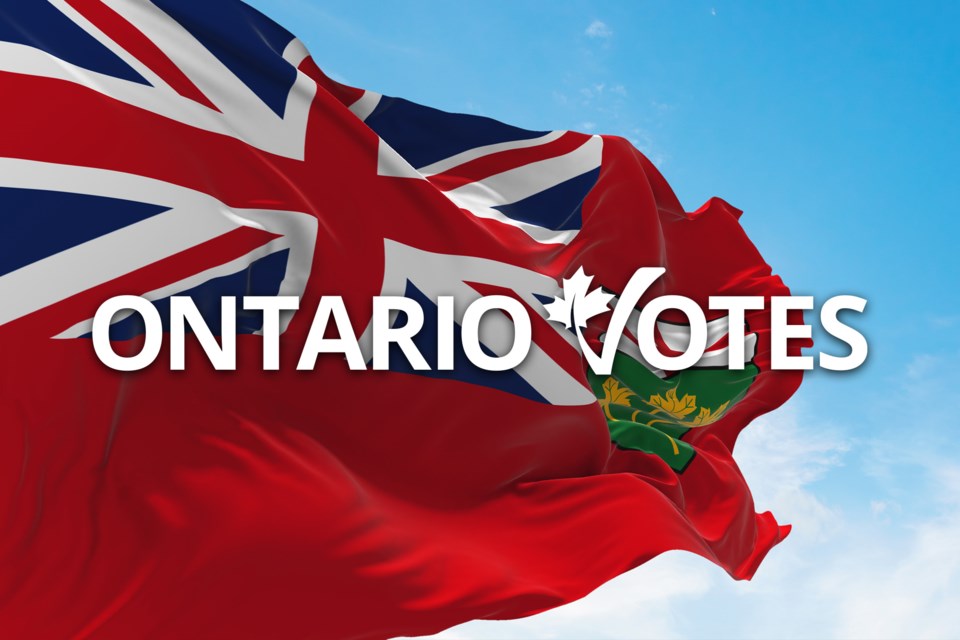Two all-candidates meetings took place Monday, giving provincial hopefuls in Barrie-Innisfil and Barrie-Springwater-Oro-Medonte (BSOM) a chance to discuss the current state and future of long-term care in Ontario as well as other issues.
The Canadian Association of Retired Persons (CARP) Chapter 36 Barrie and Area and the Huronia Branch of the National Association of Federal Retiree held two events where voters were able to meet the candidates leading up to the June 2 election.
The two ridings were broken into separate meetings, with Barrie-Innisfil candidates at 4 p.m., followed by BSOM at 7 p.m. Both events were conducted in a panel format with a one-on-one chat afterwards with guest moderator Martin Rochon.
Barrie-Innisfil candidates on hand for the event at the Sheba Shrine Centre in central Barrie were John Olthuis (Liberal Party), Bonnie North (Green Party), and Pekka Reinio (NDP).
Progressive Conservative incumbent MPP Andrea Khanjin did not appear. One of the event organizers told people in attendance and those watching the livestream that Khanjin could not attend due to a scheduling conflict, which was confirmed by a member of her campaign team in response to a followup email from BarrieToday.
The meet-and-greet also didn't include the other candidates who will be in the ballot, which includes Grace Dean from the Ontario Party, Ashlyn Steele from the New Blue, Jake Tucker from the Ontario People’s Front, and Benjamin Hughes, who is running as an independent.
Gwen Kavanagh, chair of CARP Chapter 36, explained why some candidates were invited and others weren't.
“For the last number of years, we have only invited the top four political parties to our forums. We had a candidate at an earlier political forum a number of years ago who totally disrupted a town hall,” Kavanagh said in an email to BarrieToday. “This caused us to make the decision, after that time, to focus on (alphabetically) the Green, the Liberals, the NDP and the Progressive Conservatives. (That's) not to say this decision would never be altered.”
The main topic for the panel dealt with long-term care homes and what each candidate and their party would do to make it better for an aging population.
North said the pandemic highlighted many faults within the long-term care system, but also noted those issues were present long before that as a result of years of cuts to the system. She said the Greens have a plan.
“We are going to build more long-term, not-for-profit beds — 55,000 by 2033 and 96,000 by 2041,” North said. “We will also increase long-term funding by 10 per cent, phase out for-profit homes and stop licensing new ones.”
Olthuis said that a lot of times long-term care facilities look great on the outside, but it's a different story awaits inside. He said the Liberals are dedicated to a long-term plan to help make improvements.
“We have a target of 2028 as far as ending for-profit long-term care. We’re going to fund 15,000 new assisted living homes and help 400,000 new seniors get home care with a $2-billion annual investment by 2026,” Olthuis said.
Reinio, who mentioned the deaths of 71 people at Roberta Place during the height of the pandemic, said he believes the NDP are the only party committed to ending all for-profit long-term care.
“We’re going to remove profit from long-term care because investors and shareholders shouldn’t be making money off of seniors in long term care,” said Reinio, who added the NDP would also “repeal Bill 124 immediately,” which caps the wages of front-line health-care workers at one per cent.
Meanwhile, the four invited BSOM candidates fielded similar questions at the evening meet-and-greet. Those candidates include Progressive Conservative incumbent Doug Downey, the Liberal Party's Jeff Lehman, Elyse Robinson from the Green Party, and Beverley Patchell from the NDP. Also on the ballot but not included in the meet-and-greet are Gerry Auger from the Ontario Party and Hayden Hughes from New Blue.
All four invited candidates were asked what they and their party would do to improve long term care.
Robinson said the Green Party is committed to repealing Bill 218, which provides liability protection to various businesses, non-profits and workers against lawsuits related to COVID-19 exposure.
“This is especially important in for-profit homes, because it shows these owners that they can’t get away with sacrificing their quality of service for the sake of saving money,” Robinson said. “A science table report from January of 2021 stated that Ontario’s for-profit nursing homes had 78 per cent more COVID-19 deaths than non-profits.”
Lehman said the Liberals would end for-profit facilities by 2028 and put the focus on home care.
“Helping people remain at home longer with support will require an investment fundamentally in the people who deliver those supports,” Lehman said. “We will also build smaller (long-term care) homes that integrate into neighbourhoods. No more warehousing seniors into long-term care homes that are in industrial or other low-cost locations.”
Patchell said the NDP wants to see each dollar invested into long-term care needs to go to health care and not investors.
“Delivery of the services will be transferred to public and community health organizations. We will immediately enter into discussion with for-profit operators on the orderly transition to a not-for-profit operation,” Patchell said. “We will systematically redirect public dollars to public and non-profit homes including funding for refurbishing and building.”
Downey admitted long-term care has been ignored for decades by all governments and said it shouldn’t be a political matter.
“We’re building 30,000 new beds and refurbishing 28,000 on top of that,” Downey said. “The interesting thing about these debates is you get to see the differences amongst us. My three colleagues would nationalize and put all the money into transferring ownership. We want to put the money into actually building net new beds.”
For more information on the candidates' discussion, click here.



